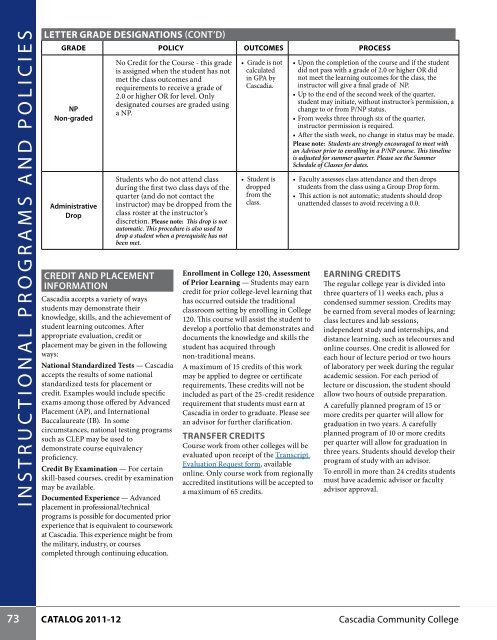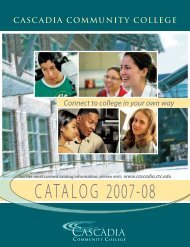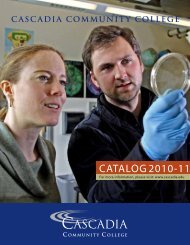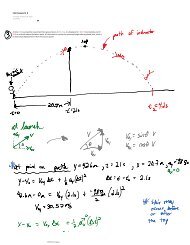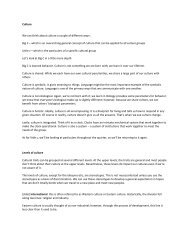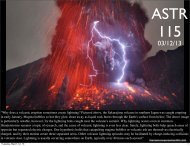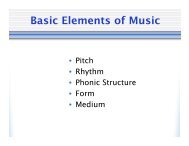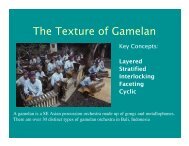2011-12 CATALOG - Cascadia Community College
2011-12 CATALOG - Cascadia Community College
2011-12 CATALOG - Cascadia Community College
Create successful ePaper yourself
Turn your PDF publications into a flip-book with our unique Google optimized e-Paper software.
Instructional Programs AND Policies<br />
Letter Grade Designations (Cont’d)<br />
GRADE POLICY OUTCOMES PROCESS<br />
NP<br />
Non-graded<br />
Administrative<br />
Drop<br />
Credit and Placement<br />
Information<br />
No Credit for the Course - this grade<br />
is assigned when the student has not<br />
met the class outcomes and<br />
requirements to receive a grade of<br />
2.0 or higher OR for level. Only<br />
designated courses are graded using<br />
a NP.<br />
Students who do not attend class<br />
during the first two class days of the<br />
quarter (and do not contact the<br />
instructor) may be dropped from the<br />
class roster at the instructor’s<br />
discretion. Please note: This drop is not<br />
automatic. This procedure is also used to<br />
drop a student when a prerequisite has not<br />
been met.<br />
<strong>Cascadia</strong> accepts a variety of ways<br />
students may demonstrate their<br />
knowledge, skills, and the achievement of<br />
student learning outcomes. After<br />
appropriate evaluation, credit or<br />
placement may be given in the following<br />
ways:<br />
National Standardized Tests — <strong>Cascadia</strong><br />
accepts the results of some national<br />
standardized tests for placement or<br />
credit. Examples would include specific<br />
exams among those offered by Advanced<br />
Placement (AP), and International<br />
Baccalaureate (IB). In some<br />
circumstances, national testing programs<br />
such as CLEP may be used to<br />
demonstrate course equivalency<br />
proficiency.<br />
Credit By Examination — For certain<br />
skill-based courses, credit by examination<br />
may be available.<br />
Documented Experience — Advanced<br />
placement in professional/technical<br />
programs is possible for documented prior<br />
experience that is equivalent to coursework<br />
at <strong>Cascadia</strong>. This experience might be from<br />
the military, industry, or courses<br />
completed through continuing education.<br />
• Grade is not<br />
calculated<br />
in GPA by<br />
<strong>Cascadia</strong>.<br />
• Student is<br />
dropped<br />
from the<br />
class.<br />
Enrollment in <strong>College</strong> <strong>12</strong>0, Assessment<br />
of Prior Learning — Students may earn<br />
credit for prior college-level learning that<br />
has occurred outside the traditional<br />
classroom setting by enrolling in <strong>College</strong><br />
<strong>12</strong>0. This course will assist the student to<br />
develop a portfolio that demonstrates and<br />
documents the knowledge and skills the<br />
student has acquired through<br />
non-traditional means.<br />
A maximum of 15 credits of this work<br />
may be applied to degree or certificate<br />
requirements. These credits will not be<br />
included as part of the 25-credit residence<br />
requirement that students must earn at<br />
<strong>Cascadia</strong> in order to graduate. Please see<br />
an advisor for further clarification.<br />
Transfer Credits<br />
Course work from other colleges will be<br />
evaluated upon receipt of the Transcript<br />
Evaluation Request form, available<br />
online. Only course work from regionally<br />
accredited institutions will be accepted to<br />
a maximum of 65 credits.<br />
• Upon the completion of the course and if the student<br />
did not pass with a grade of 2.0 or higher OR did<br />
not meet the learning outcomes for the class, the<br />
instructor will give a final grade of NP.<br />
• Up to the end of the second week of the quarter,<br />
student may initiate, without instructor’s permission, a<br />
change to or from P/NP status.<br />
• From weeks three through six of the quarter,<br />
instructor permission is required.<br />
• After the sixth week, no change in status may be made.<br />
Please note: Students are strongly encouraged to meet with<br />
an Advisor prior to enrolling in a P/NP course. This timeline<br />
is adjusted for summer quarter. Please see the Summer<br />
Schedule of Classes for dates.<br />
• Faculty assesses class attendance and then drops<br />
students from the class using a Group Drop form.<br />
• This action is not automatic; students should drop<br />
unattended classes to avoid receiving a 0.0.<br />
Earning Credits<br />
The regular college year is divided into<br />
three quarters of 11 weeks each, plus a<br />
condensed summer session. Credits may<br />
be earned from several modes of learning:<br />
class lectures and lab sessions,<br />
independent study and internships, and<br />
distance learning, such as telecourses and<br />
online courses. One credit is allowed for<br />
each hour of lecture period or two hours<br />
of laboratory per week during the regular<br />
academic session. For each period of<br />
lecture or discussion, the student should<br />
allow two hours of outside preparation.<br />
A carefully planned program of 15 or<br />
more credits per quarter will allow for<br />
graduation in two years. A carefully<br />
planned program of 10 or more credits<br />
per quarter will allow for graduation in<br />
three years. Students should develop their<br />
program of study with an advisor.<br />
To enroll in more than 24 credits students<br />
must have academic advisor or faculty<br />
advisor approval.<br />
73 Catalog <strong>2011</strong>-<strong>12</strong> <strong>Cascadia</strong> <strong>Community</strong> <strong>College</strong>


